Engerman S.L., Gallman R.E. The Cambridge Economic History of the United States, Vol. 1: The Colonial Era
Подождите немного. Документ загружается.

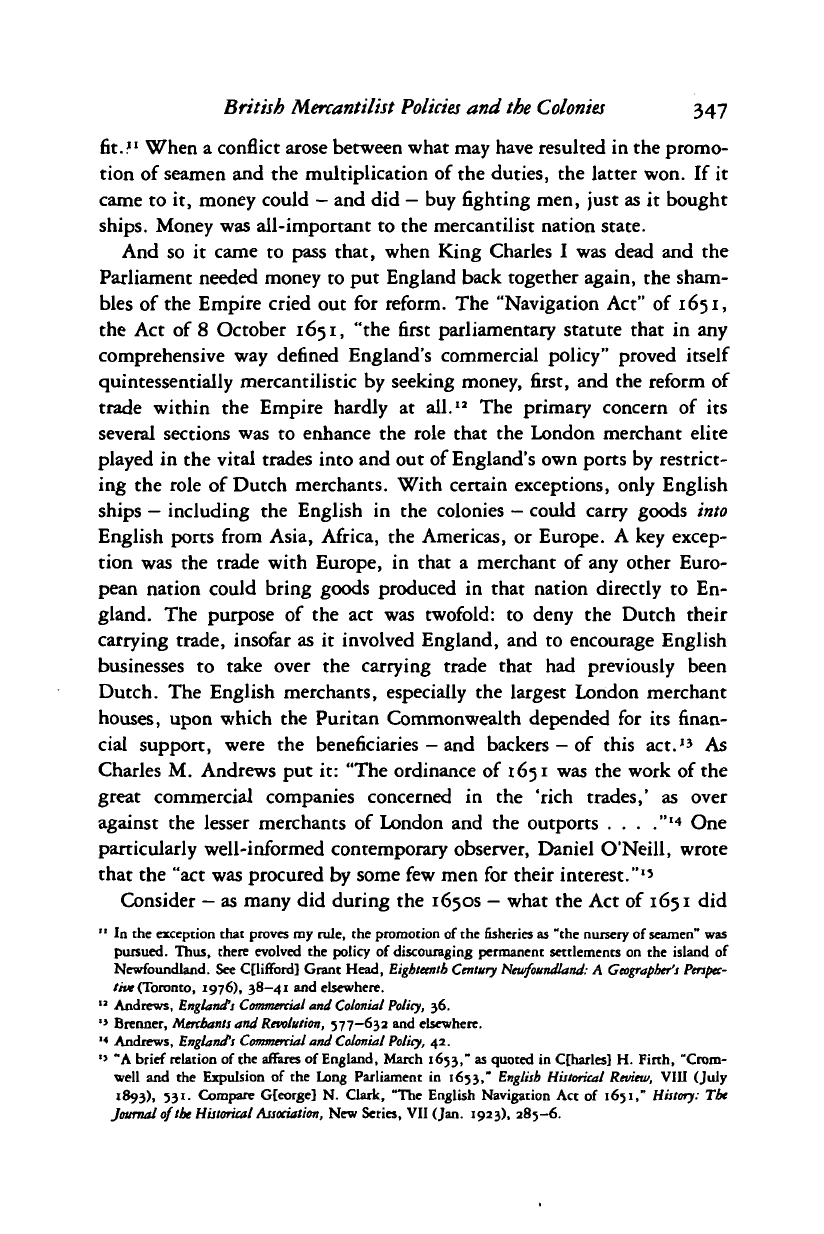
British Mercantilist
Policies
and
the Colonies
347
fit.?
1
When a conflict arose between what may have resulted in the promo-
tion of seamen and the multiplication of the duties, the latter won. If it
came to it, money could - and did
—
buy fighting men, just as it bought
ships.
Money was all-important to the mercantilist nation state.
And so it came to pass that, when King Charles I was dead and the
Parliament needed money to put England back together again, the sham-
bles of the Empire cried out for reform. The "Navigation Act" of 1651,
the Act of 8 October 1651, "the first parliamentary statute that in any
comprehensive way defined England's commercial policy" proved itself
quintessentially mercantilistic by seeking money, first, and the reform of
trade within the Empire hardly at all.
12
The primary concern of its
several sections was to enhance the role that the London merchant elite
played in the vital trades into and out of England's own ports by restrict-
ing the role of Dutch merchants. With certain exceptions, only English
ships
—
including the English in the colonies - could carry goods into
English ports from Asia, Africa, the Americas, or Europe. A key excep-
tion was the trade with Europe, in that a merchant of any other Euro-
pean nation could bring goods produced in that nation directly to En-
gland. The purpose of the act was twofold: to deny the Dutch their
carrying trade, insofar as it involved England, and to encourage English
businesses to take over the carrying trade that had previously been
Dutch. The English merchants, especially the largest London merchant
houses, upon which the Puritan Commonwealth depended for its finan-
cial support, were the beneficiaries
—
and backers
—
of this act.'
3
As
Charles M. Andrews put it: "The ordinance of 1651 was the work of the
great commercial companies concerned in the 'rich trades,' as over
against the lesser merchants of London and the outports . . . ."'•» One
particularly well-informed contemporary observer, Daniel O'Neill, wrote
that the "act was procured by some few men for their interest."'
5
Consider
—
as many did during the 1650s
—
what the Act of 1651 did
11
In the exception that proves my rule, the promotion of the fisheries as "the nursery of
seamen"
was
pursued. Thus, there evolved the policy of discouraging permanent settlements on the island of
Newfoundland. See Cfliffbrd] Grant Head,
Eighteenth
Century
Newfoundland:
A
Geographer's
Perspec-
tive (Toronto, 1976), 38—41 and elsewhere.
" Andrews, England's
Commercial
and Colonial
Policy,
36.
15
Brenner,
Merchants
and
Revolution,
577—632 and elsewhere.
14
Andrews, England's
Commercial
and Colonial
Policy,
42.
•' "A brief relation of the affares of England, March 1653," as quoted in Qharles] H. Firth, "Crom-
well and the Expulsion of the Long Parliament in 1653," English Historical Review, VIII (July
1893),
531. Compare G[eorge] N. Clark, "The English Navigation Act of
1651,"
History: The
Journal of the Historical
Association,
New Series, VII (Jan. 1923), 285-6.
Cambridge Histories Online © Cambridge University Press, 2008
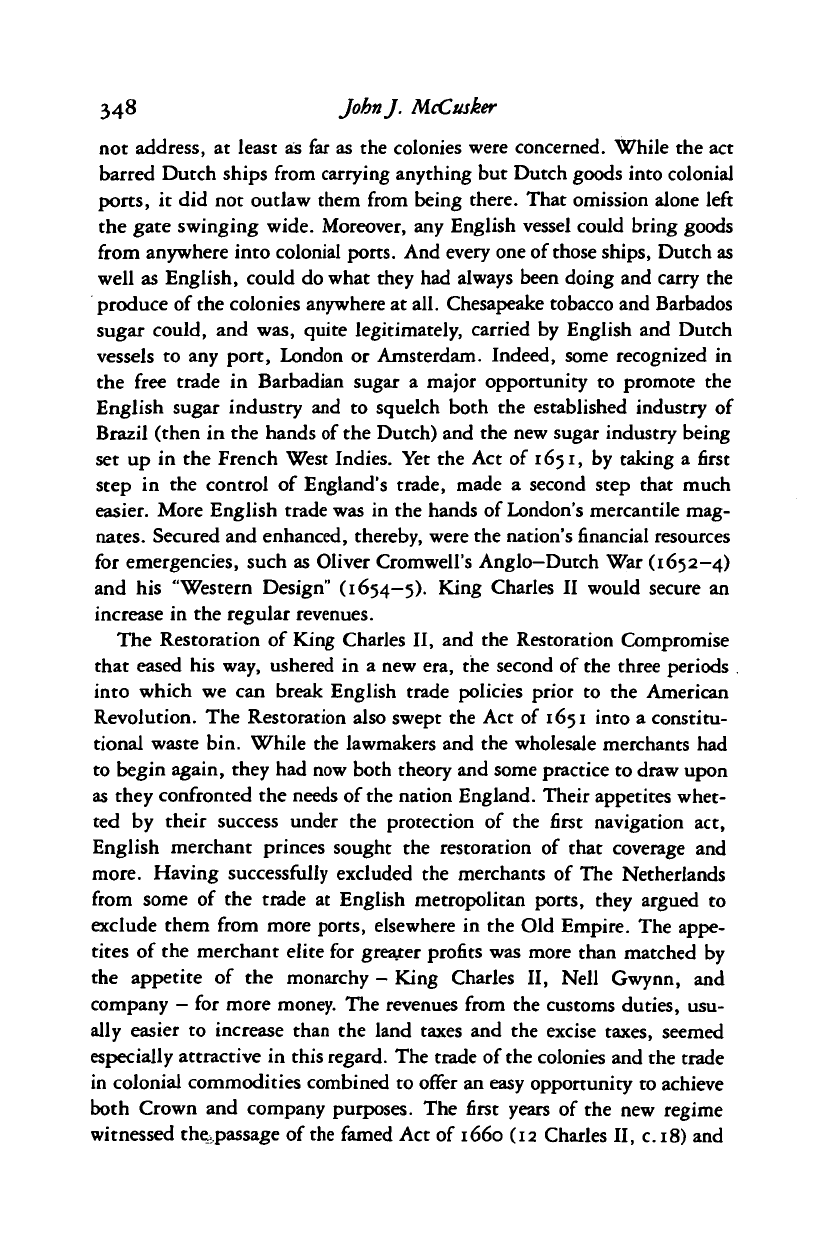
348
JohnJ.
McCusker
not address, at least as far as the colonies were concerned. While the act
barred Dutch ships from carrying anything but Dutch goods into colonial
ports,
it did not outlaw them from being there. That omission alone left
the gate swinging wide. Moreover, any English vessel could bring goods
from anywhere into colonial ports. And every one of
those
ships, Dutch as
well as English, could do what they had always been doing and carry the
produce of the colonies anywhere at all. Chesapeake tobacco and Barbados
sugar could, and was, quite legitimately, carried by English and Dutch
vessels to any port, London or Amsterdam. Indeed, some recognized in
the free trade in Barbadian sugar a major opportunity to promote the
English sugar industry and to squelch both the established industry of
Brazil (then in the hands of the Dutch) and the new sugar industry being
set up in the French West Indies. Yet the Act of
1651,
by taking a first
step in the control of England's trade, made a second step that much
easier. More English trade was in the hands of London's mercantile mag-
nates.
Secured and enhanced, thereby, were the nation's
financial
resources
for emergencies, such as Oliver Cromwell's Anglo—Dutch War (1652-4)
and his "Western Design" (1654—5). Kmg Charles II would secure an
increase in the regular revenues.
The Restoration of King Charles II, and the Restoration Compromise
that eased his way, ushered in a new era, the second of the three periods .
into which we can break English trade policies prior to the American
Revolution. The Restoration also swept the Act of 1651 into a constitu-
tional waste bin. While the lawmakers and the wholesale merchants had
to begin again, they had now both theory and some practice to draw upon
as they confronted the needs of
the
nation England. Their appetites whet-
ted by their success under the protection of the first navigation act,
English merchant princes sought the restoration of that coverage and
more. Having successfully excluded the merchants of The Netherlands
from some of the trade at English metropolitan ports, they argued to
exclude them from more ports, elsewhere in the Old Empire. The appe-
tites of the merchant elite for greater profits was more than matched by
the appetite of the monarchy - King Charles II, Nell Gwynn, and
company - for more money. The revenues from the customs duties, usu-
ally easier to increase than the land taxes and the excise taxes, seemed
especially attractive in this regard. The trade of the colonies and the trade
in colonial commodities combined to offer an easy opportunity to achieve
both Crown and company purposes. The first years of the new regime
witnessed th&.passage of the famed Act of 1660 (12 Charles II,
c.
18)
and
Cambridge Histories Online © Cambridge University Press, 2008
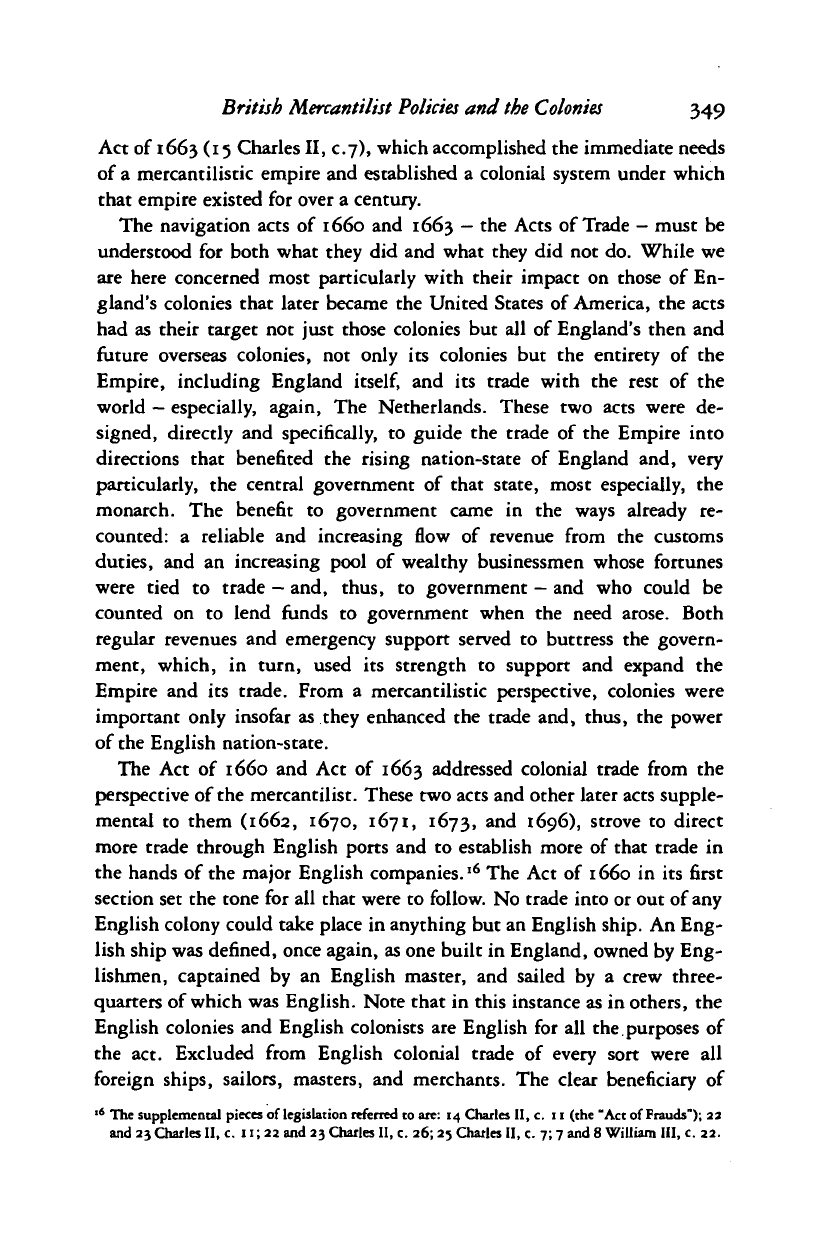
British Mercantilist
Policies
and
the Colonies
349
Act of
1663
(15 Charles II, c.7), which accomplished the immediate needs
of a mercantilistic empire and established a colonial system under which
that empire existed for over a century.
The navigation acts of 1660 and 1663
—
the Acts of Trade
—
must be
understood for both what they did and what they did not do. While we
are here concerned most particularly with their impact on those of En-
gland's colonies that later became the United States of America, the acts
had as their target not just those colonies but all of England's then and
future overseas colonies, not only its colonies but the entirety of the
Empire, including England
itself,
and its trade with the rest of the
world - especially, again, The Netherlands. These two acts were de-
signed, directly and specifically, to guide the trade of the Empire into
directions that benefited the rising nation-state of England and, very
particularly, the central government of that state, most especially, the
monarch. The benefit to government came in the ways already re-
counted: a reliable and increasing flow of revenue from the customs
duties, and an increasing pool of wealthy businessmen whose fortunes
were tied to trade
—
and, thus, to government
—
and who could be
counted on to lend funds to government when the need arose. Both
regular revenues and emergency support served to buttress the govern-
ment, which, in turn, used its strength to support and expand the
Empire and its trade. From a mercantilistic perspective, colonies were
important only insofar as they enhanced the trade and, thus, the power
of the English nation-state.
The Act of 1660 and Act of 1663 addressed colonial trade from the
perspective of
the
mercantilist. These two acts and other later acts supple-
mental to them (1662, 1670, 1671, 1673,
an
d 1696), strove to direct
more trade through English ports and to establish more of that trade in
the hands of the major English companies.
16
The Act of 1660 in its first
section set the tone for all that were to follow. No trade into or out of
any
English colony could take place in anything but an English ship. An Eng-
lish ship was defined, once again, as one built in England, owned by Eng-
lishmen, captained by an English master, and sailed by a crew three-
quarters of which was English. Note that in this instance as in others, the
English colonies and English colonists are English for all the purposes of
the act. Excluded from English colonial trade of every sort were all
foreign ships, sailors, masters, and merchants. The clear beneficiary of
16
The supplemental pieces of legislation referred to are: 14 Charles II, c. 11 (the "Act of
Frauds');
22
and 23 Charles II, c. 11; 22 and 23 Charles II, c. 26; 25 Charles II, c. 7; 7 and 8 William III, c. 22.
Cambridge Histories Online © Cambridge University Press, 2008
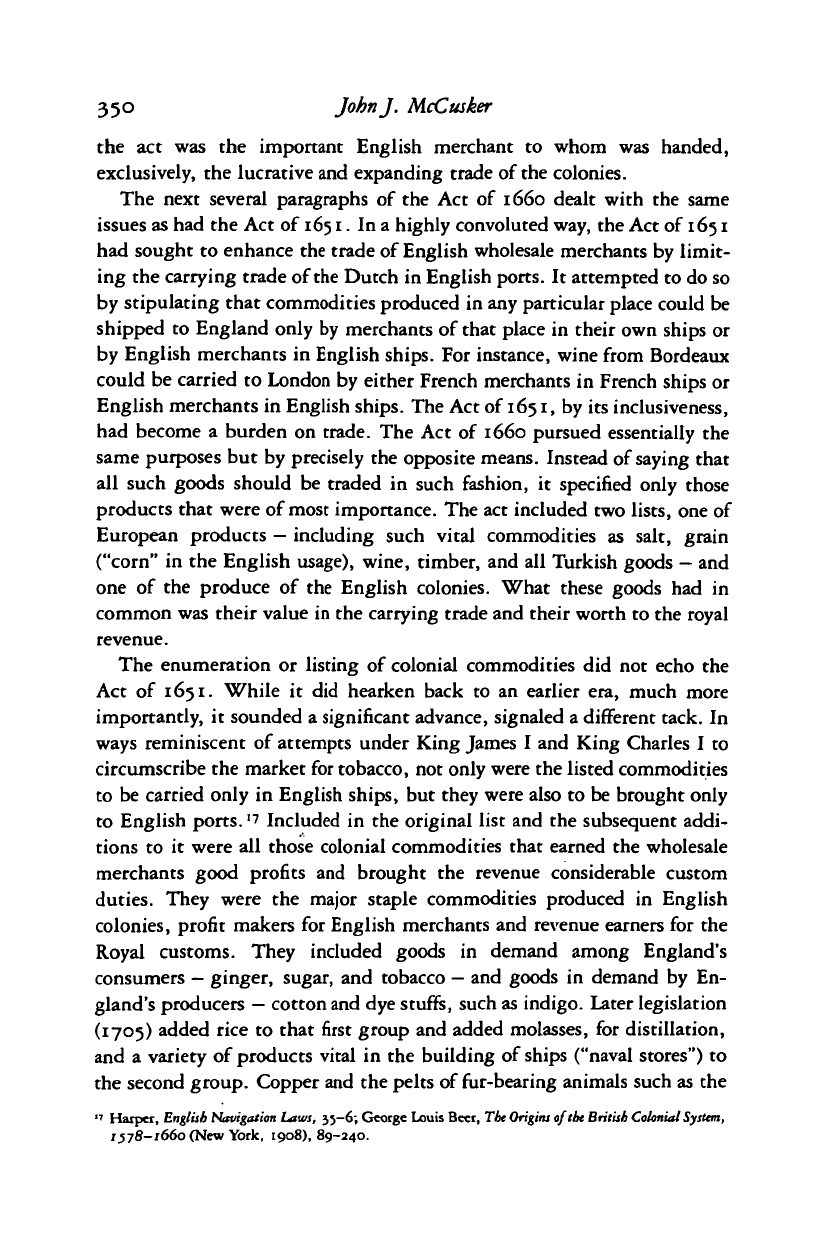
35°
JohnJ.
McCusker
the
act was the
important English merchant
to
whom
was
handed,
exclusively, the lucrative and expanding trade of the colonies.
The next several paragraphs
of
the
Act of
1660 dealt with
the
same
issues as had the Act
of
1651.
In a highly convoluted way, the Act
of
1651
had sought
to
enhance the trade of English wholesale merchants by limit-
ing the carrying trade of
the
Dutch in English ports.
It
attempted to do so
by stipulating that commodities produced in any particular place could be
shipped
to
England only by merchants of that place
in
their own ships
or
by English merchants
in
English ships. For instance, wine from Bordeaux
could be carried to London by either French merchants
in
French ships or
English merchants in English ships. The Act of
1651,
by its inclusiveness,
had become
a
burden
on
trade. The Act
of
1660 pursued essentially
the
same purposes
but
by precisely the opposite means. Instead of saying that
all such goods should
be
traded
in
such fashion,
it
specified only those
products that were of most importance. The act included two lists, one of
European products
—
including such vital commodities
as
salt, grain
("corn"
in
the English usage), wine, timber, and all Turkish goods
—
and
one
of the
produce
of
the English colonies. What these goods
had in
common was their value in the carrying trade and their worth to the royal
revenue.
The enumeration
or
listing
of
colonial commodities
did not
echo
the
Act
of
1651. While
it did
hearken back
to an
earlier era, much more
importantly,
it
sounded a significant advance, signaled a different tack.
In
ways reminiscent
of
attempts under King James
I
and King Charles
I to
circumscribe the market for tobacco, not only were the listed commodities
to be carried only
in
English ships, but they were also to be brought only
to English ports.
I7
Included
in
the original list and the subsequent addi-
tions
to it
were
all
those colonial commodities that earned the wholesale
merchants good profits
and
brought
the
revenue considerable custom
duties. They were
the
major staple commodities produced
in
English
colonies, profit makers for English merchants and revenue earners
for the
Royal customs. They included goods
in
demand among England's
consumers
-
ginger, sugar,
and
tobacco
—
and goods
in
demand
by En-
gland's producers
—
cotton and dye stuffs, such as indigo. Later legislation
(1705) added rice
to
that first group and added molasses,
for
distillation,
and
a
variety of products vital
in
the building of ships ("naval stores")
to
the second group. Copper and the pelts of fur-bearing animals such as the
" Harper, English Navigation Laws, 35-6; George Louis Beer,
The Origins
of the British Colonial System,
i.578-i66o(New York, 1908), 89-240.
Cambridge Histories Online © Cambridge University Press, 2008
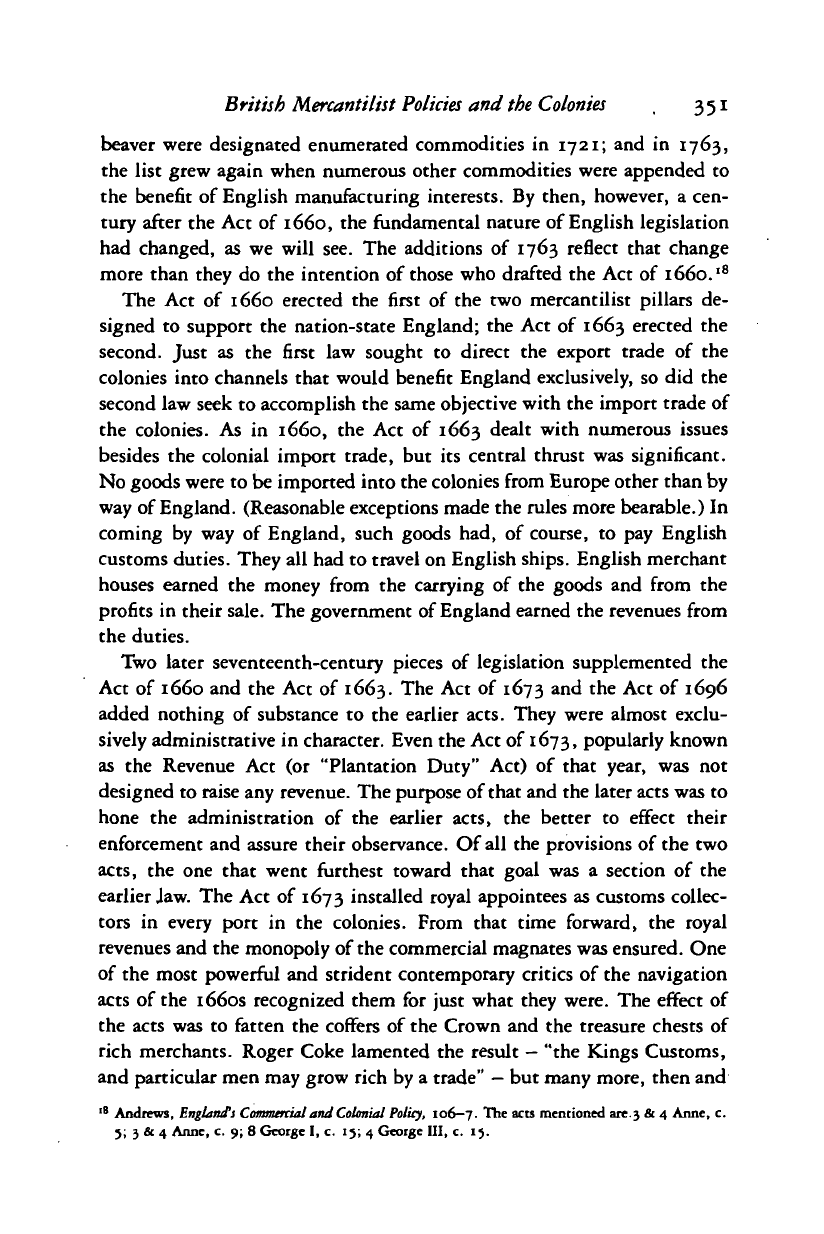
British Mercantilist
Policies
and
the Colonies
. 351
beaver were designated enumerated commodities in 1721; and in 1763,
the list grew again when numerous other commodities were appended to
the benefit of English manufacturing interests. By then, however, a cen-
tury after the Act of 1660, the fundamental nature of English legislation
had changed, as we will see. The additions of 1763 reflect that change
more than they do the intention of those who drafted the Act of 1660.
l8
The Act of 1660 erected the first of the two mercantilist pillars de-
signed to support the nation-state England; the Act of 1663 erected the
second. Just as the first law sought to direct the export trade of the
colonies into channels that would benefit England exclusively, so did the
second law seek to accomplish the same objective with the import trade of
the colonies. As in 1660, the Act of 1663 dealt with numerous issues
besides the colonial import trade, but its central thrust was significant.
No goods were to be imported into the colonies from Europe other than by
way of
England.
(Reasonable exceptions made the rules more bearable.) In
coming by way of England, such goods had, of course, to pay English
customs duties. They all had to travel on English ships. English merchant
houses earned the money from the carrying of the goods and from the
profits in their sale. The government of England earned the revenues from
the duties.
Two later seventeenth-century pieces of legislation supplemented the
Act of 1660 and the Act of 1663. The Act of 1673 and the Act of 1696
added nothing of substance to the earlier acts. They were almost exclu-
sively administrative in character. Even the Act of
1673,
popularly known
as the Revenue Act (or "Plantation Duty" Act) of that year, was not
designed to raise any revenue. The purpose of that and the later acts was to
hone the administration of the earlier acts, the better to effect their
enforcement and assure their observance. Of all the provisions of the two
acts,
the one that went furthest toward that goal was a section of the
earlier
Jaw.
The Act of 1673 installed royal appointees as customs collec-
tors in every port in the colonies. From that time forward, the royal
revenues and the monopoly of
the
commercial magnates was ensured. One
of the most powerful and strident contemporary critics of the navigation
acts of the 1660s recognized them for just what they were. The effect of
the acts was to fatten the coffers of the Crown and the treasure chests of
rich merchants. Roger Coke lamented the result - "the Kings Customs,
and particular men may grow rich by a trade"
—
but many more, then and
18
Andrews,
England's Commercial
and Colonial
Policy,
106-7. Th
e
*tx&
mentioned are.3 & 4 Anne, c.
5; 3 & 4 Anne, c. 9; 8 George I, c. 15; 4 George III, c. 15.
Cambridge Histories Online © Cambridge University Press, 2008
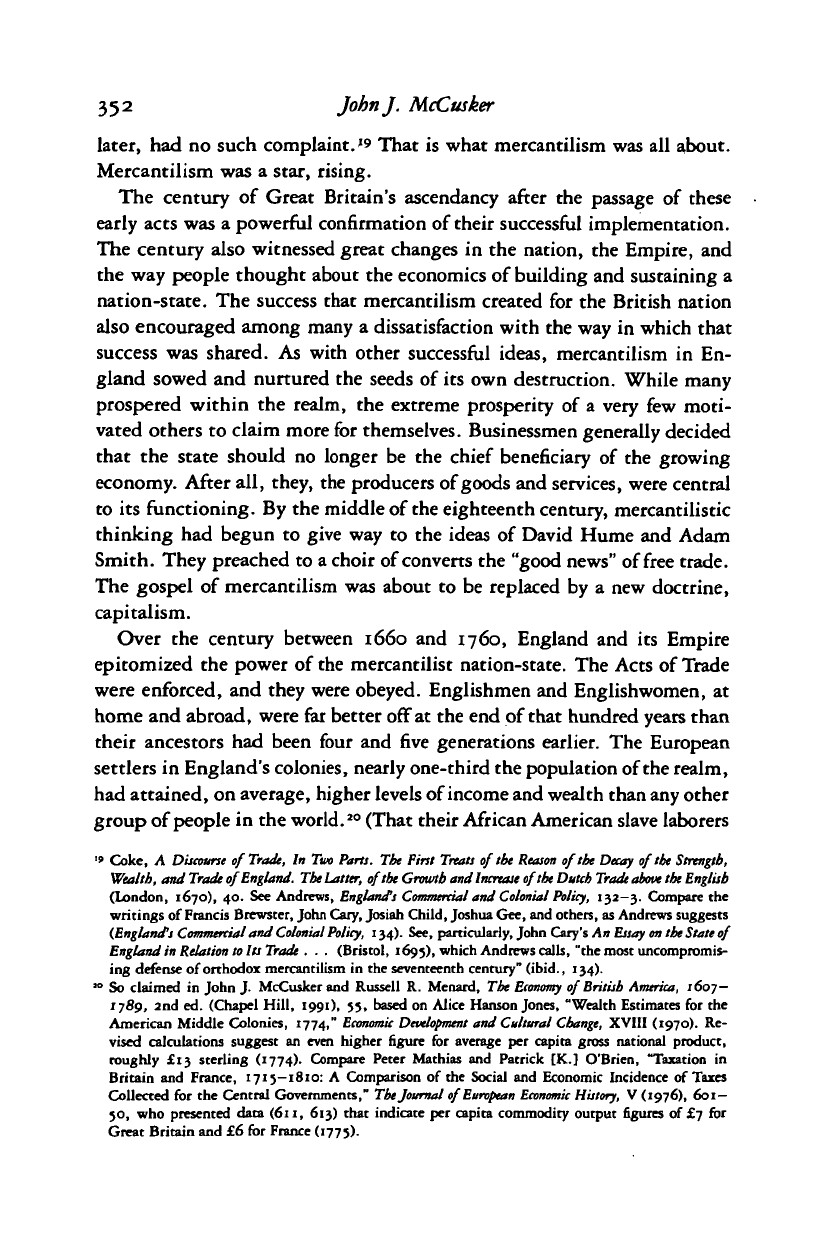
352
JohnJ.
McCusker
later, had no such complaint." That is what mercantilism was all about.
Mercantilism was a star, rising.
The century of Great Britain's ascendancy after the passage of these
early acts was a powerful confirmation of their successful implementation.
The century also witnessed great changes in the nation, the Empire, and
the way people thought about the economics of building and sustaining a
nation-state. The success that mercantilism created for the British nation
also encouraged among many a dissatisfaction with the way in which that
success was shared. As with other successful ideas, mercantilism in En-
gland sowed and nurtured the seeds of its own destruction. While many
prospered within the realm, the extreme prosperity of a very few moti-
vated others to claim more for themselves. Businessmen generally decided
that the state should no longer be the chief beneficiary of the growing
economy. After all, they, the producers of goods and services, were central
to its functioning. By the middle of
the
eighteenth century, mercantilistic
thinking had begun to give way to the ideas of David Hume and Adam
Smith. They preached to a choir of converts the "good news" of free trade.
The gospel of mercantilism was about to be replaced by a new doctrine,
capitalism.
Over the century between 1660 and 1760, England and its Empire
epitomized the power of the mercantilist nation-state. The Acts of Trade
were enforced, and they were obeyed. Englishmen and Englishwomen, at
home and abroad, were far better off at the end of that hundred years than
their ancestors had been four and five generations earlier. The European
settlers in England's colonies, nearly one-third the population of the realm,
had attained, on average, higher levels of income and wealth than any other
group of people in the world.
20
(That their African American slave laborers
'» Coke, A Discourse of Trade, In Two Parts. The First Treats of
the Reason
of
the
Decay of
the
Strength,
Wealth,
and Trade of
England.
The
Latter,
of the Growth and
Increase
of the Dutch
Trade above
the English
(London, 1670), 40. See Andrews, England's
Commercial
and Colonial
Policy,
132-3. Compare the
writings of Francis Brewster, John Cary, Josiah Child, Joshua Gee, and others, as Andrews suggests
{England's
Commercial
and
Colonial
Policy,
134). See, particularly, John Cary's An
Essay on the
State
of
England in Relation to Its Trade . . . (Bristol, 1695), which Andrews calls, "the most uncompromis-
ing defense of orthodox mercantilism in the seventeenth century" (ibid., 134).
10
So claimed in John J. McCusker and Russell R. Menard, The
Economy
of British America,
1607—
1789,
2nd ed. (Chapel Hill, 1991), 55, based on Alice Hanson Jones, "Wealth Estimates for the
American Middle Colonies, 1774,"
Economic Development
and Cultural
Change,
XVIII (1970). Re-
vised calculations suggest an even higher figure for average per capita gross national product,
roughly £13 sterling (1774). Compare Peter Mathias and Patrick [K.] O'Brien, "Taxation in
Britain and France, 1715-1810: A Comparison of the Social and Economic Incidence of Taxes
Collected for the Central Governments," The Journal of
European Economic
History, V (1976), 601
—
50,
who presented data (611, 613) that indicate per capita commodity output figures of £7 for
Great Britain and £6 for France (177$).
Cambridge Histories Online © Cambridge University Press, 2008
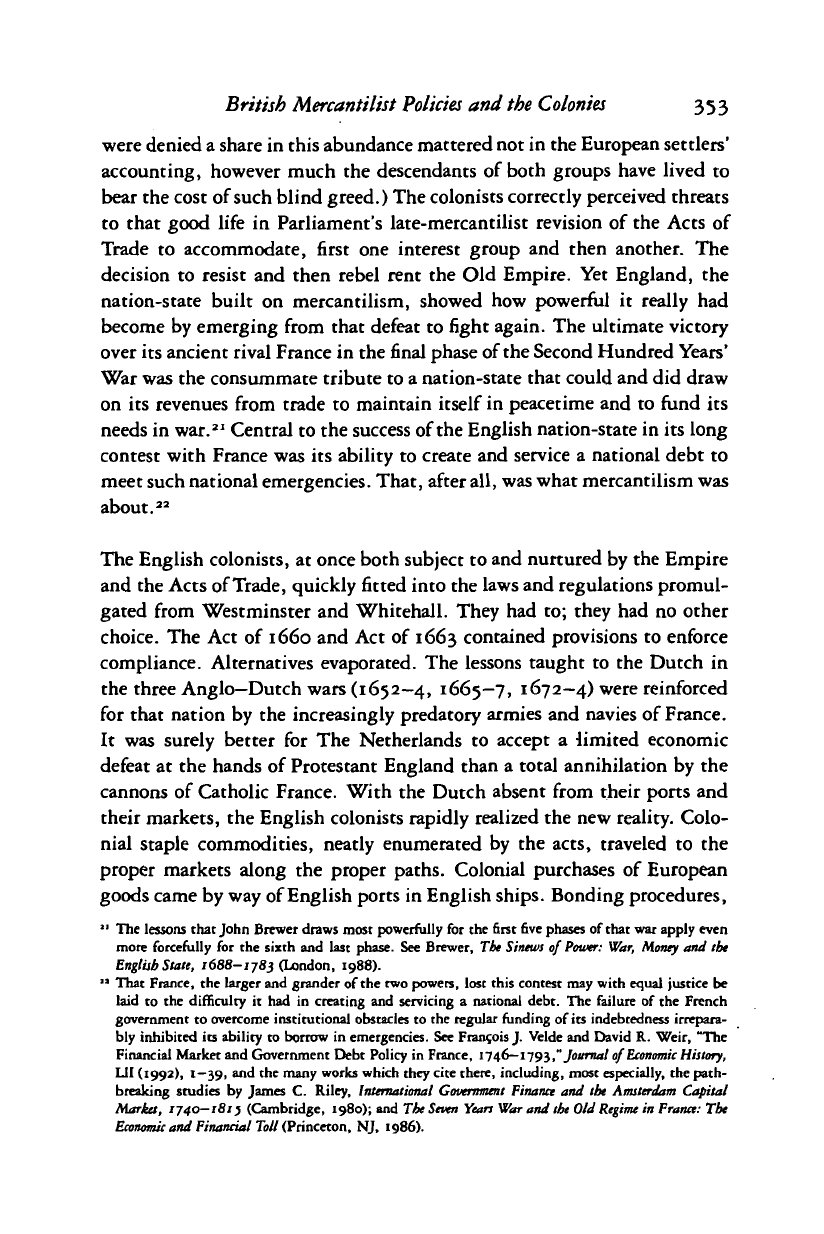
British Mercantilist
Policies
and
the Colonies
353
were denied
a
share in this abundance mattered not in the European settlers'
accounting, however much the descendants of both groups have lived to
bear the cost of such blind greed.) The colonists correctly perceived threats
to that good life in Parliament's late-mercantilist revision of the Acts of
Trade to accommodate, first one interest group and then another. The
decision to resist and then rebel rent the Old Empire. Yet England, the
nation-state built on mercantilism, showed how powerful it really had
become by emerging from that defeat to fight again. The ultimate victory
over its ancient rival France in the
final
phase of the Second Hundred Years'
War was the consummate tribute to a nation-state that could and did draw
on its revenues from trade to maintain itself in peacetime and to fund its
needs in war.
21
Central to the success of the English nation-state in its long
contest with France was its ability to create and service a national debt to
meet such national emergencies. That, after
all,
was
what mercantilism was
about.
22
The English colonists, at once both subject to and nurtured by the Empire
and the Acts of Trade, quickly fitted into the laws and regulations promul-
gated from Westminster and Whitehall. They had to; they had no other
choice. The Act of 1660 and Act of 1663 contained provisions to enforce
compliance. Alternatives evaporated. The lessons taught to the Dutch in
the three Anglo—Dutch wars (1652-4, 1665-7, 1672-4) were reinforced
for that nation by the increasingly predatory armies and navies of France.
It was surely better for The Netherlands to accept a limited economic
defeat at the hands of Protestant England than a total annihilation by the
cannons of Catholic France. With the Dutch absent from their ports and
their markets, the English colonists rapidly realized the new reality. Colo-
nial staple commodities, neatly enumerated by the acts, traveled to the
proper markets along the proper paths. Colonial purchases of European
goods came by way of English ports in English
ships.
Bonding procedures,
" The lessons that John Brewer draws most powerfully for the first five phases of that war apply even
more forcefully for the sixth and last phase. See Brewer, The Sinews of
Power:
War, Money and the
English
State, 1688-1783 (London, 1988).
" That France, the larger and grander of the two powers, lost this contest may with equal justice be
laid to the difficulty it had in creating and servicing a national debt. The failure of the French
government to overcome institutional obstacles to the regular funding of its indebtedness irrepara-
bly inhibited its ability to borrow in emergencies. See Francois J. Velde and David R. Weir, "The
Financial Market and Government Debt Policy in France, 1746—1793, "Journal of
Economic
History,
LJI (1992), t—39, and the many works which they cite there, including, most especially, the path-
breaking studies by James C. Riley, International
Government Finance
and the Amsterdam Capital
Maria, 1740—1813 (Cambridge, 1980); and The
Seven Years
War and
the
Old
Regime
in
France:
The
Economic
and Financial Toll (Princeton, NJ, 1986).
Cambridge Histories Online © Cambridge University Press, 2008
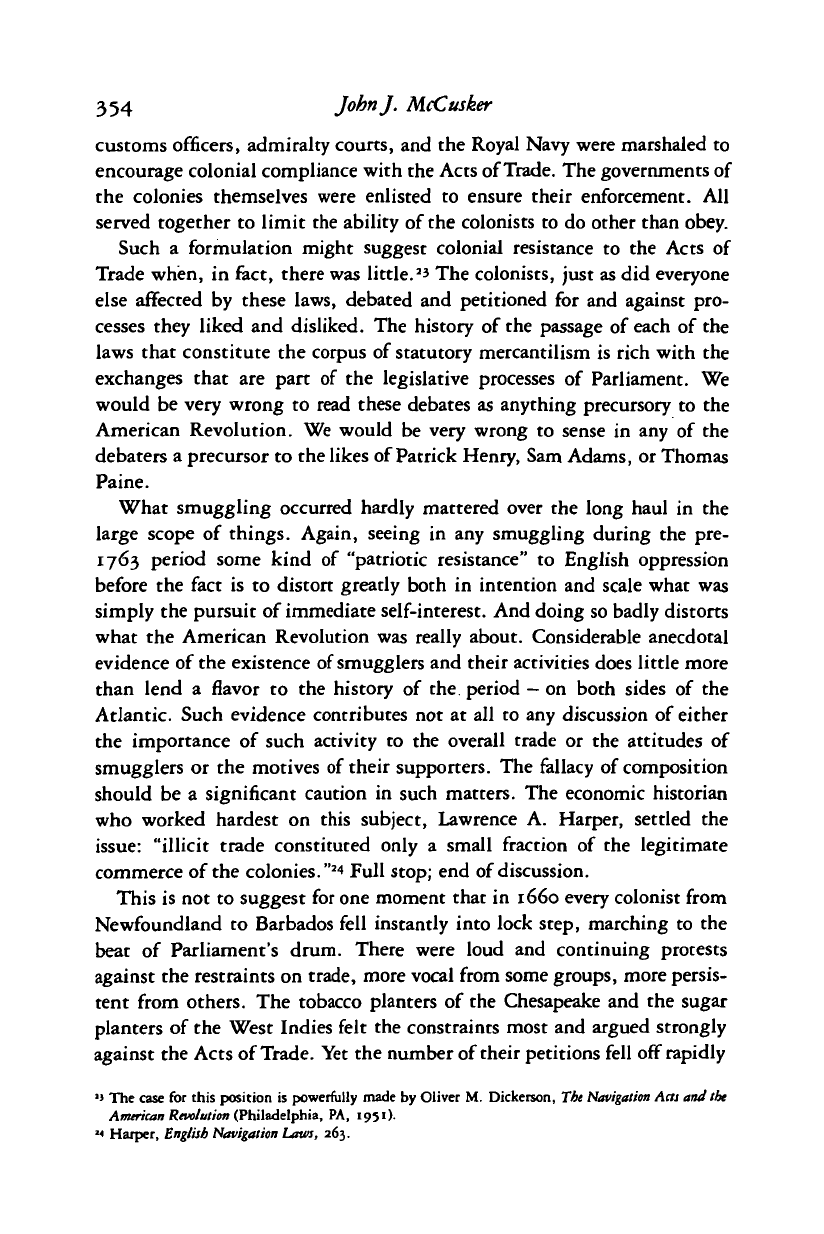
354 John]. McCusker
customs officers, admiralty courts, and the Royal Navy were marshaled to
encourage colonial compliance with the Acts of Trade. The governments of
the colonies themselves were enlisted to ensure their enforcement. All
served together to limit the ability of the colonists to do other than obey.
Such a formulation might suggest colonial resistance to the Acts of
Trade when, in fact, there was little.
23
The colonists, just as did everyone
else affected by these laws, debated and petitioned for and against pro-
cesses they liked and disliked. The history of the passage of each of the
laws that constitute the corpus of statutory mercantilism is rich with the
exchanges that are part of the legislative processes of Parliament. We
would be very wrong to read these debates as anything precursory to the
American Revolution. We would be very wrong to sense in any of the
debaters a precursor to the likes of Patrick Henry, Sam Adams, or Thomas
Paine.
What smuggling occurred hardly mattered over the long haul in the
large scope of things. Again, seeing in any smuggling during the pre-
1763 period some kind of "patriotic resistance" to English oppression
before the fact is to distort greatly both in intention and scale what was
simply the pursuit of immediate self-interest. And doing so badly distorts
what the American Revolution was really about. Considerable anecdotal
evidence of the existence of smugglers and their activities does little more
than lend a flavor to the history of the period - on both sides of the
Atlantic. Such evidence contributes not at all to any discussion of either
the importance of such activity to the overall trade or the attitudes of
smugglers or the motives of their supporters. The fallacy of composition
should be a significant caution in such matters. The economic historian
who worked hardest on this subject, Lawrence A. Harper, settled the
issue: "illicit trade constituted only a small fraction of the legitimate
commerce of the colonies."
24
Full stop; end of discussion.
This is not to suggest for one moment that in 1660 every colonist from
Newfoundland to Barbados fell instantly into lock step, marching to the
beat of Parliament's drum. There were loud and continuing protests
against the restraints on trade, more vocal from some groups, more persis-
tent from others. The tobacco planters of the Chesapeake and the sugar
planters of the West Indies felt the constraints most and argued strongly
against the Acts of Trade. Yet the number of their petitions fell off rapidly
•) The case for this position is powerfully made by Oliver M. Dickerson, The Navigation Acts and
the
American Revolution (Philadelphia, PA,
"< Harper, English Navigation Laws, 263.
Cambridge Histories Online © Cambridge University Press, 2008
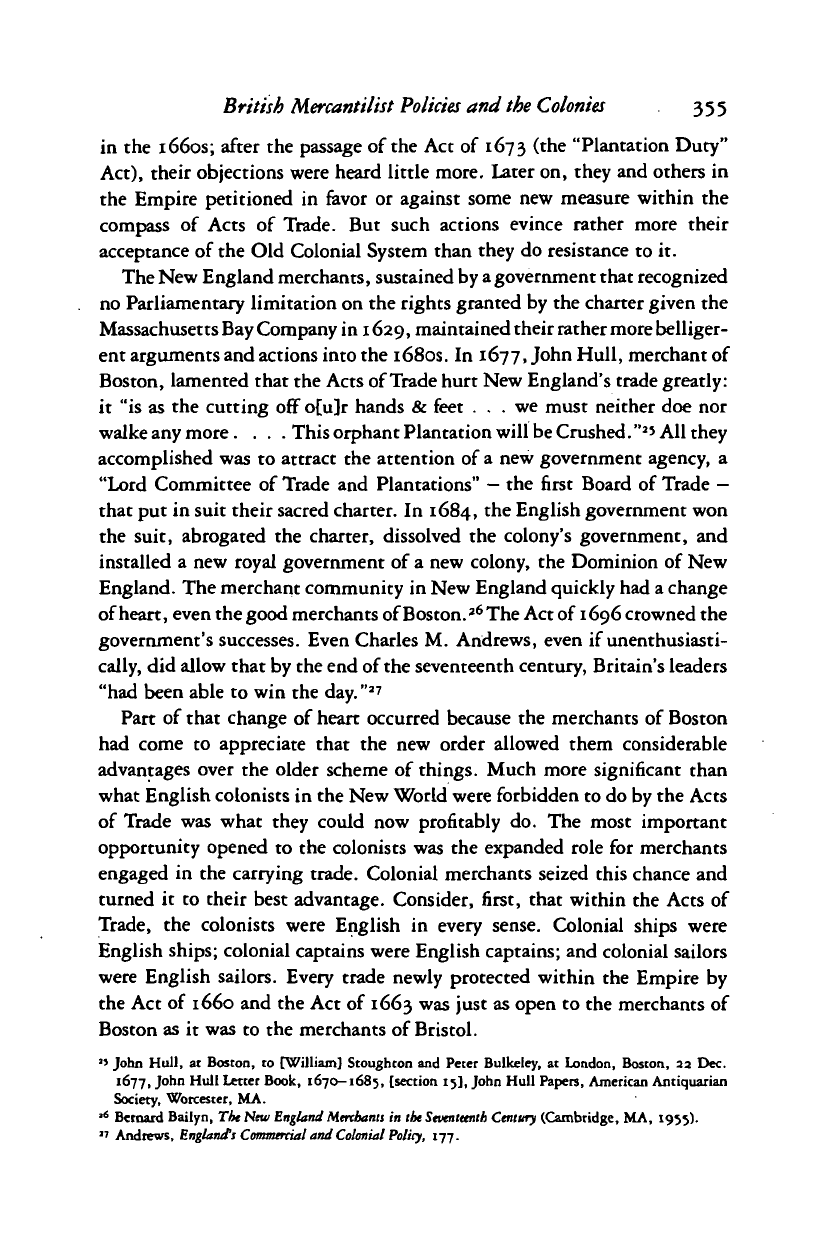
British Mercantilist
Policies
and the Colonies 355
in the 1660s; after the passage of the Act of 1673 (
tne
"Plantation Duty"
Act),
their objections were heard little more. Later on, they and others in
the Empire petitioned in favor or against some new measure within the
compass of Acts of Trade. But such actions evince rather more their
acceptance of the Old Colonial System than they do resistance to it.
The New England merchants, sustained by
a
government that recognized
no Parliamentary limitation on the rights granted by the charter given the
Massachusetts Bay Company in 1629, maintained their rather more belliger-
ent arguments and actions into the 1680s. In 1677, John Hull, merchant of
Boston, lamented that the Acts of Trade hurt New England's trade greatly:
it "is as the cutting off o{u]r hands & feet ... we must neither doe nor
walke any more.... This orphant Plantation will be Crushed.
"*'
All they
accomplished was to attract the attention of a new government agency, a
"Lord Committee of Trade and Plantations" - the first Board of Trade -
that put in suit their sacred charter. In 1684, the English government won
the suit, abrogated the charter, dissolved the colony's government, and
installed a new royal government of a new colony, the Dominion of New
England. The merchant community in New England quickly had a change
of heart, even the good merchants of Boston.
26
The Act of 1696 crowned the
government's successes. Even Charles M. Andrews, even if unenthusiasti-
cally, did allow that by the end of the seventeenth century, Britain's leaders
"had been able to win the
day.
"
27
Part of that change of heart occurred because the merchants of Boston
had come to appreciate that the new order allowed them considerable
advantages over the older scheme of things. Much more significant than
what English colonists in the New World were forbidden to do by the Acts
of Trade was what they could now profitably do. The most important
opportunity opened to the colonists was the expanded role for merchants
engaged in the carrying trade. Colonial merchants seized this chance and
turned it to their best advantage. Consider, first, that within the Acts of
Trade, the colonists were English in every sense. Colonial ships were
English ships; colonial captains were English captains; and colonial sailors
were English sailors. Every trade newly protected within the Empire by
the Act of 1660 and the Act of 1663 was just as open to the merchants of
Boston as it was to the merchants of Bristol.
'* John Hull, at Boston, to [William) Stoughcon and Peter Bulkeley, at London, Boston, 22 Dec.
1677, John Hull Letter Book, 1670-1685, [section 15], John Hull Papers, American Antiquarian
Society, Worcester, MA.
•* Bernard Bailyn, The New England
Merchants
in
the Seventeenth
Century (Cambridge, MA, 1955).
" Andrews, England's
Commercial
and Colonial
Policy,
177.
Cambridge Histories Online © Cambridge University Press, 2008
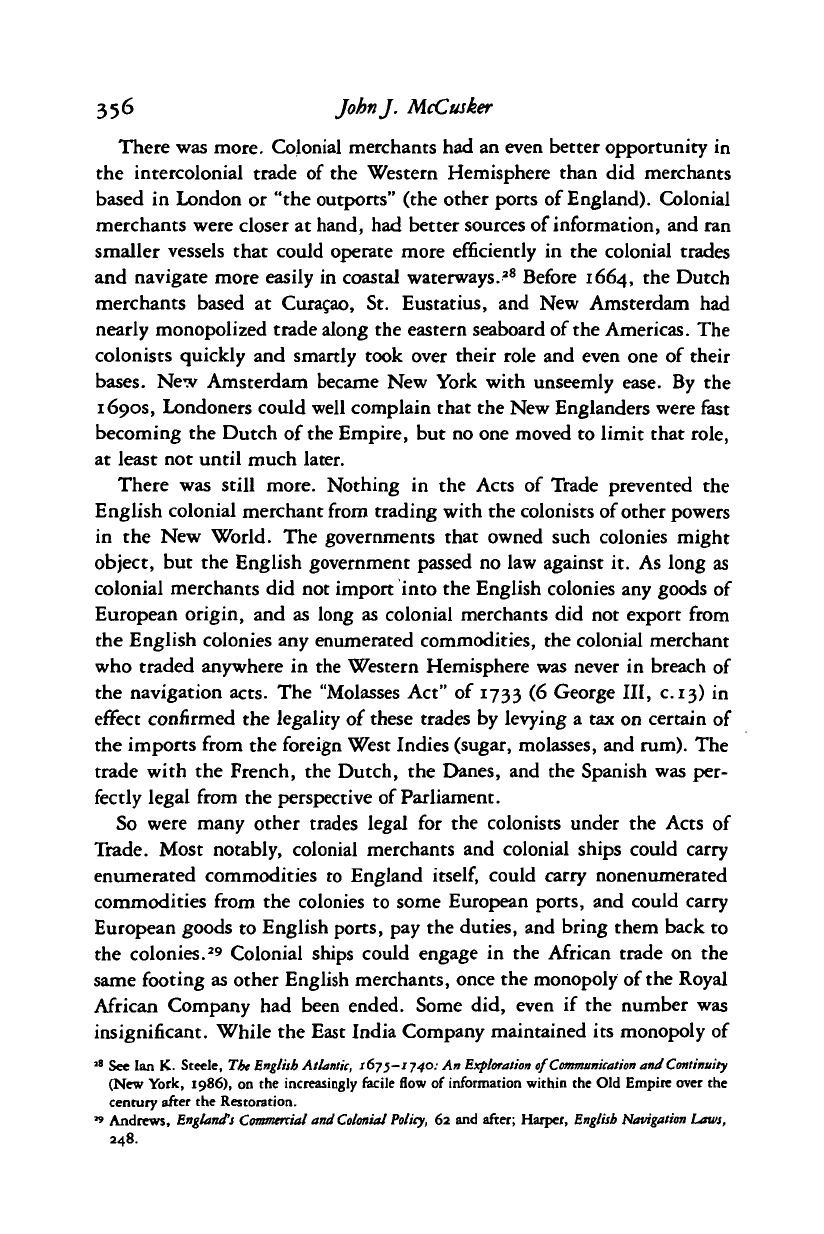
356
JohnJ.
McCusker
There was more. Colonial merchants had an even better opportunity in
the intercolonial trade of the Western Hemisphere than did merchants
based in London or "the outports" (the other ports of
England).
Colonial
merchants were closer at hand, had better sources of information, and ran
smaller vessels that could operate more efficiently in the colonial trades
and navigate more easily in coastal waterways.
28
Before 1664, the Dutch
merchants based at Curasao, St. Eustatius, and New Amsterdam had
nearly monopolized trade along the eastern seaboard of
the
Americas. The
colonists quickly and smartly took over their role and even one of their
bases.
New Amsterdam became New York with unseemly ease. By the
1690s, Londoners could well complain that the New Englanders were fast
becoming the Dutch of
the
Empire, but no one moved to limit that role,
at least not until much later.
There was still more. Nothing in the Acts of Trade prevented the
English colonial merchant from trading with the colonists of other powers
in the New World. The governments that owned such colonies might
object, but the English government passed no law against it. As long as
colonial merchants did not import into the English colonies any goods of
European origin, and as long as colonial merchants did not export from
the English colonies any enumerated commodities, the colonial merchant
who traded anywhere in the Western Hemisphere was never in breach of
the navigation acts. The "Molasses Act" of 1733 (6 George III,
c.
13) in
effect confirmed the legality of these trades by levying a tax on certain of
the imports from the foreign West Indies (sugar, molasses, and rum). The
trade with the French, the Dutch, the Danes, and the Spanish was per-
fectly legal from the perspective of Parliament.
So were many other trades legal for the colonists under the Acts of
Trade. Most notably, colonial merchants and colonial ships could carry
enumerated commodities to England
itself,
could carry nonenumerated
commodities from the colonies to some European ports, and could carry
European goods to English ports, pay the duties, and bring them back to
the colonies.
2
' Colonial ships could engage in the African trade on the
same footing as other English merchants, once the monopoly of
the
Royal
African Company had been ended. Some did, even if the number was
insignificant. While the East India Company maintained its monopoly of
28
See Ian K. Steele, The English Atlantic, i6j}-i 740: An
Exploration
of
Communication
and Continuity
(New York, 1986), 00 the increasingly facile flow of information within the Old Empire over the
century after the Restoration.
*» Andrews, England's
Commercial
and Colonial
Policy,
62 and after; Harper, English Navigation Laws,
248.
Cambridge Histories Online © Cambridge University Press, 2008
